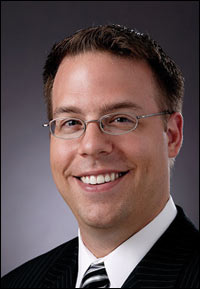Consultants can be well worth the money
By: Jane Pribek//November 2, 2010//
You don’t want to find out what 12 people think about your case on the first day of trial. You want to think about it a long time before then.
That’s according to Milwaukee personal injury lawyer Paul Scoptur, who also works as a trial consultant.
All cases have weak spots that a consultant can identify and help remedy, in a cost-effective way.
“You don’t have to spend an arm and a leg,” said Scoptur. “In fact, that’s why I got into it in the late ‘90s.
“At the time, there were consultants, usually social scientists with no trial background, who were charging $100,000 or more, and who were not always getting the results — whereas I actually try cases and have a social science background as well.”
Scoptur explained that attorneys who work as consultants are not listed as attorneys of record on pleadings, nor do they make formal court appearances. Rather, they are treated like retained, non-testifying experts, so the work-product doctrine applies and their work is nondiscoverable.
The tasks trial consultants might perform include, but aren’t limited to: helping with the preparation of opening and closing arguments, and voir dire; witness preparation; conducting focus groups and/or mock trials; and preparing trial exhibits and jury questionnaires.
The Case for Consultants

David E. Frank, a civil litigator and director of the Trial Science Institute at Reinhart Boerner Van Deuren sc in Milwaukee, said trial consultants are able to give unbiased, expert opinions — something of great value to lawyers, who often become very close to their facts, clients and witnesses, occasionally to their detriment.
“There’s nothing like watching a mock jury deliberate and seeing how they came to a result,” said Frank.
“You learn so much by seeing how they get there, seeing who’s the dominant personality in the room and how he or she convinced others to see it their way, as well as what facts they found persuasive, and which ones weren’t.”
Both Scoptur and Frank believe consultants are under-utilized in the state, probably because their cost is perceived as excessive.
But, they counter, consultants are a bargain, given the flexible array of services they can provide, from the stripped-down, half-day focus group, to full-blown mock trials followed up with detailed reports and all-day consultation during the actual trial.
Moreover, their fees are negotiable. Scoptur, for example, sometimes works for a flat rate for a whole day’s work (past 5 p.m. if necessary), or sometimes he works on a contingency basis, or even a hybrid of the two.
Frank adds that using local experts keeps the price down. “There are a lot of quality consultants working in larger markets than Wisconsin, but like most things in big cities, they cost more. But also, we bring the advantage of being local people who understand the local flavor,” he said, noting that his consulting has been limited thus far to Wisconsin.
Both Frank and Scoptur are members of the American Society of Trial Consultants, and say its website is a good way to start the search for a qualified trial consultant. The leaders of that group are very highly regarded, notes Scoptur, but membership is open to anyone who wants to work as a trial consultant.
Therefore you should engage in due diligence before hiring.
Becoming a Consultant
The ASTC has been a valuable source of information and networking, said Scoptur and Frank. Both are frequent speakers on juries and trial techniques, for that group and many others, which has been the most effective tool in marketing themselves as consultants.
Scoptur has created a website for his consultancy, and the Trial Science Institute, an ancillary business of Frank’s firm, likewise has a separate website to promote the consulting work of himself and attorney Lisa N. Kass. The firm’s marketing department additionally provides support, such as brochures.
With regard to liability, there’s no bright-line rule requiring consultants to have malpractice policies, and Frank said it’s a hot topic of debate among ASTC members. Both Frank and Scoptur have made no special declarations on their professional malpractice policies.
But they also make it clear to clients that they’re not practicing law when serving as consultants, which is important for purposes of conflicts of interest ethics rules, reminds Frank. He also does not give legal advice; for example, he never comments on the whether he believes a plaintiff has satisfied the elements of the tort he’s trying to establish.
Both also sign the aforementioned confidentiality agreements, as do any members of focus groups or mock juries. And, on another previously-mentioned point, Scoptur said he recently nixed a client’s plan to examine a lay witness other than the client before a focus group, fearing that their work-product protection would disappear.
Scoptur did not set up a separate business entity from his firm, Aiken & Scoptur SC, for the consulting portion of his workdays. Rather, he said early on, he and his law partner agreed to pool those earnings, since he does the consulting work during regular hours. However, when he retires from practicing, he’ll likely create a business for the consulting he plans to do into his golden years.
Which leads to perhaps the central question: Why become a consultant?
Because it’s extremely rewarding and less stressful, said Scoptur.
He likes the variety of taking on a role other than practitioner once in a while, and although he’s invested in the outcome of a client’s trial, it’s still easier to sleep at night when it isn’t he who has lived and breathed a plaintiff’s matter for months or years.
Additionally, unlike Frank’s consulting, his has taken him to pockets of the country he might never have experienced, and has expanded his base of knowledge about the regional differences that exist. He’s also met some outstanding lawyers from across the country.
Frank especially likes that last part. He said, “I get to watch so many great lawyers present cases. It helps me improve my own trial practice. And juries are fascinating to me.”
Jane Pribek can be reached at [email protected].
Legal News
- Wisconsin attorney loses law license, ordered to pay $16K fine
- Former Wisconsin police officer charged with 5 bestiality felony counts
- Judge reject’s Trump’s bid for a new trial in $83.3 million E. Jean Carroll defamation case
- Dozens of deaths reveal risks of injecting sedatives into people restrained by police
- The Latest: Supreme Court arguments conclude in Trump immunity case
- Net neutrality restored as FCC votes to regulate internet providers
- Wisconsin Attorney General asks Congress to expand reproductive health services
- Attorney General Kaul releases update at three-year anniversary of clergy and faith leader abuse initiative
- State Bar leaders remain deeply divided over special purpose trust
- Former Wisconsin college chancellor fired over porn career is fighting to keep his faculty post
- Pecker says he pledged to be Trump campaign’s ‘eyes and ears’ during 2016 race
- A conservative quest to limit diversity programs gains momentum in states
WLJ People
- Power 30 Personal Injury Attorneys – Russell Nicolet
- Power 30 Personal Injury Attorneys – Benjamin Nicolet
- Power 30 Personal Injury Attorneys – Dustin T. Woehl
- Power 30 Personal Injury Attorneys – Katherine Metzger
- Power 30 Personal Injury Attorneys – Joseph Ryan
- Power 30 Personal Injury Attorneys – James M. Ryan
- Power 30 Personal Injury Attorneys – Dana Wachs
- Power 30 Personal Injury Attorneys – Mark L. Thomsen
- Power 30 Personal Injury Attorneys – Matthew Lein
- Power 30 Personal Injury Attorneys – Jeffrey A. Pitman
- Power 30 Personal Injury Attorneys – William Pemberton
- Power 30 Personal Injury Attorneys – Howard S. Sicula






